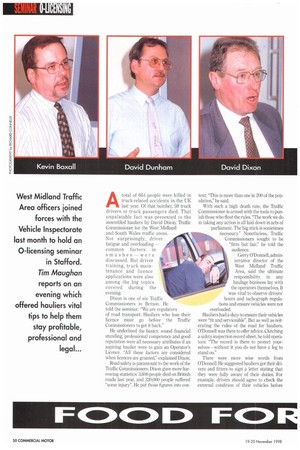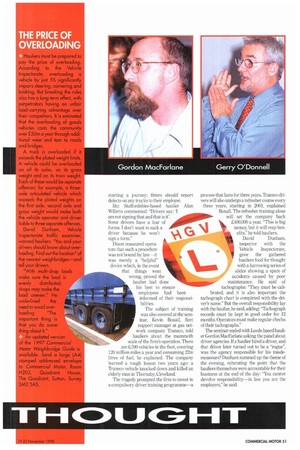Esium
Page 52

Page 53

If you've noticed an error in this article please click here to report it so we can fix it.
West Midland Traffic Area officers joined forces with the Vehicle Inspectorate last month to hold an 0-licensing seminar in Stafford. Tim Maughan reports on an evening which offered hauliers vital tips to help them stay profitable, professional and legal...
Atotal of 664 people were killed in truck-related accidents in the UK last year. Of that number, 59 truck drivers or truck passengers died. That unpalatable fact was presented to the assembled hauliers by David Dixon, Traffic Commissioner for the West Midland
and South Wales traffic areas. Not surprisingly, driver fatigue and overloading— common factors in smashes—were discussed. But driver training, truck main tenance and licence applications were also among the big topics covered during the evening.
Dixon is one of six Traffic Commissioners in Britain. He told the seminar: "We are regulators of road transport. Hauliers who lose their licence must go before the Traffic Commissioners to get it back," He underlined the basics: sound financial standing, professional competence and good reputation were all necessary attributes if an aspiring haulier were to gain an Operator's Licence. "All these factors are considered when licences are granted," explained Dixon.
Road safety is paramount to the work of the Traffic Commissioners. Dixon gave more harrowing statistics: 3,600 people died on British roads last year, and 320,000 people suffered "some injury". He put those figures into con
text: "This is more than one in 200 of the population," he said.
With such a high death rate, the Traffic Commissioner is armed with the tools to punish those who flout the rules. "The work we do in taking any action is all laid down in acts of parliament. The big stick is sometimes necessary." Nonetheless, Traffic Commissioners sought to be "firm but fair," he told the audience.
Gerry O'Donnell, administrative director of the West Midland Traffic Area, said the ultimate responsibility in any haulage business lay with the operators themselves. It was vital to observe drivers' hours and tachograph regulations and ensure vehicles were not overloaded.
Hauliers had a duty to ensure their vehicles were "fit and serviceable". But as well as reiterating the rules of the road for hauliers, O'Donnell was there to offer advice. Clutching a safety inspection record sheet, he told operators: "The record is there to protect yourselves—without it you do not have a leg to stand on."
There were more wise words from O'Donnell. He suggested hauliers got their drivers and fitters to sign a letter stating that they were fully aware of their duties. For example, drivers should agree to check the external condition of their vehicles before starting a journey; fitters should report defects on any trucks to their employer.
But Staffordshire-based haulier Alan Willetts commented: "Drivers say: 'I am not signing that and that is it'. Some drivers have a fear of forms. I don't want to sack a driver because he won't sign a form."
Dixon reassured operators that such a procedure was not bound by law—it was merely a "helpful" device which, in the event that things went wrong, proved the haulier had done his best to ensure employees had been informed of their responsibilities.
The subject of training was also covered at the seminar. Kevin Boxall, fleet support manager at gas network company Transco, told hauliers about the mammoth scale of the firm's operation. There are 6,700 vehicles in the fleet, covering 120 million miles a year and consuming 22m litres of fuel, he explained. The company learned a tough lesson two years ago: a Transco vehicle knocked down and killed an elderly man in Thornaby, Cleveland.
The tragedy prompted the firm to invest in a compulsory driver training programme—a process that lasts for three years. Transco drivers will also undergo a refresher course every three years, starling in 2001, explained Boxall. The refresher training alone will set the company back £400,000 a year. "This is big money, but it will reap benefits," he told hauliers.
David Dunham, inspector with the Vehicle Inspectorate, gave the gathered hauliers food for thought with a harrowing series of slides showing a spate of accidents caused by poor maintenance, lie said of tachographs: "They must be cali brated, and it is also important the tachograph chart is completed with the driver's name." But the overall responsibility lay with the haulier, he said, adding: "Tachograph records must be kept in good order for 12 months, Operators must make regular checks of their tachographs."
The seminar ended with Leeds-based haulier Gordon MacFarlane asking the panel about driver agencies. If a haulier hired a driver, and that driver later turned out to be a "rogue", was the agency responsible for his misdemeanours? Dunham summed up the theme of the evening, reiterating the point that the hauliers themselves were accountable for their business at the end of the day: "You cannot devolve responsibility—in law you are the employers," he said.
THE PRICE OF OVERLOADING
Hauliers must be prepared t pay the price of overloadin According to the Vehic 4 Inspectorate, overloading a vehicle by just 5% significantly impairs steering, cornering and braking. But breaking the rules also hos a long-term effect, with perpetrators having on unfair load-carrying advantage over their competitors. It is estimated that the overloading of goods vehicles costs the community over £50m a year through additional wear and tear to roads and bridges.
A truck is overloaded if it exceeds the plated weight limits. A vehicle could be overloaded on all its axles, on its gross weight and on its train weight. Each of these would be separate offences: for example, a threeaxle articulated vehicle which exceeds the plated weights on the first axle, second axle and gross weight would make both the vehicle operator and driver liable to three separate offences.
David Dunham, Vehicle j Inspectorate traffic examiner warned hauliers: "You and you drivers should know about ove loading. Find out the location* o . the nearest weighbridges—and tell your drivers.
"With multi-drop loads make sure the load is evenly distributed; drops may make the load uneven." He underlined the need to avoid over
loading: "The important thing is that you do something about it."
An updated version of the 1997 Commercial Motor Weighbridge Guide is available. Send a large {A4} stamped addressed envelope to Commercial Motor, Room H203, Quadrant House, The Quadrant, Sutton, Surrey SM2 5AS.
















































































































